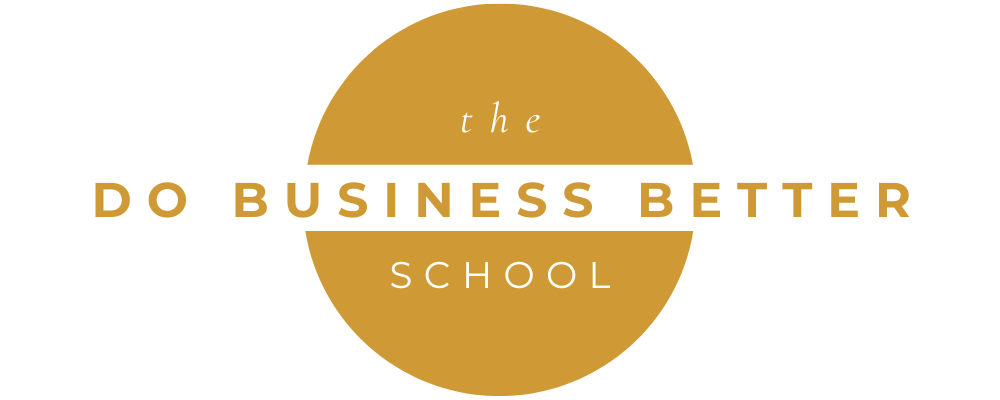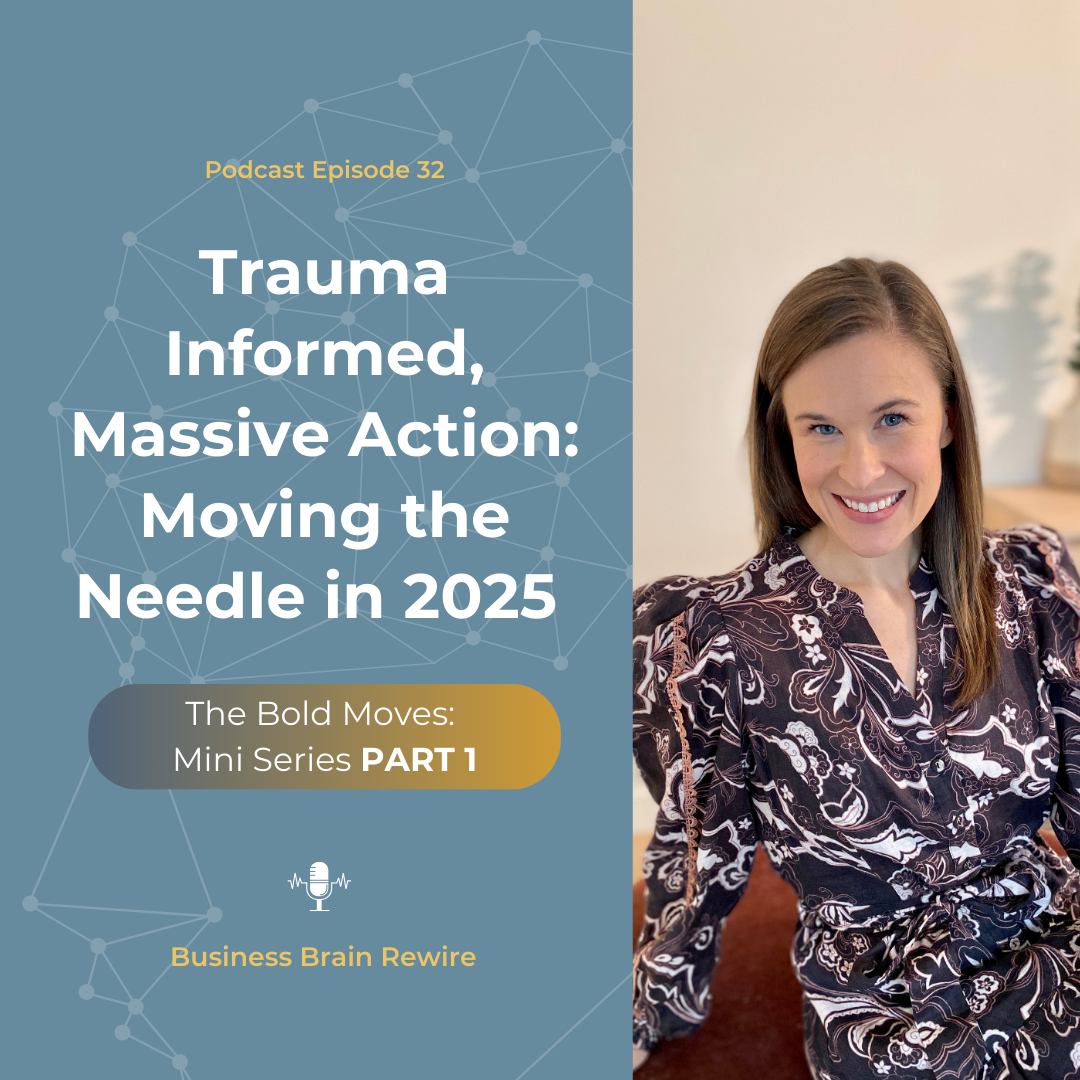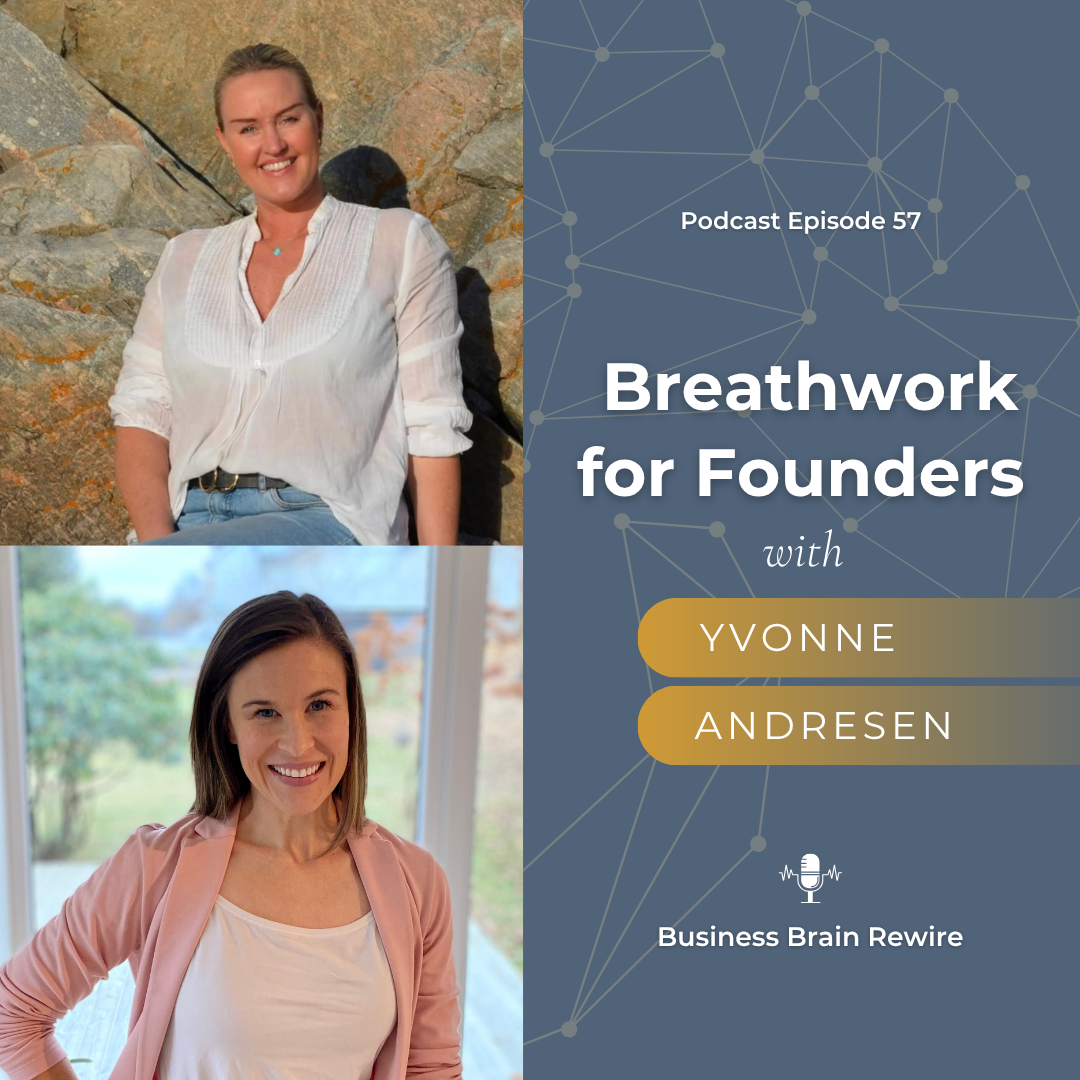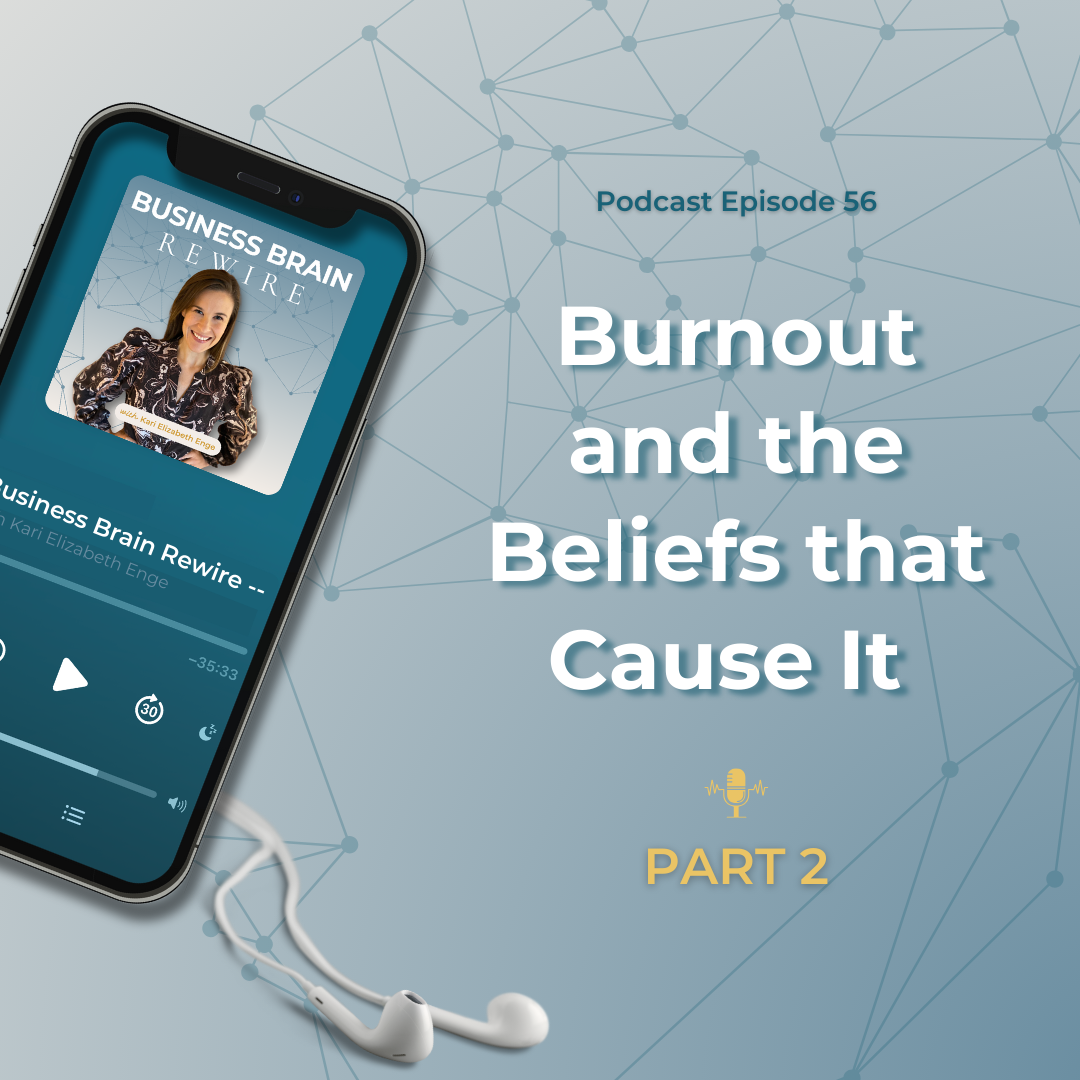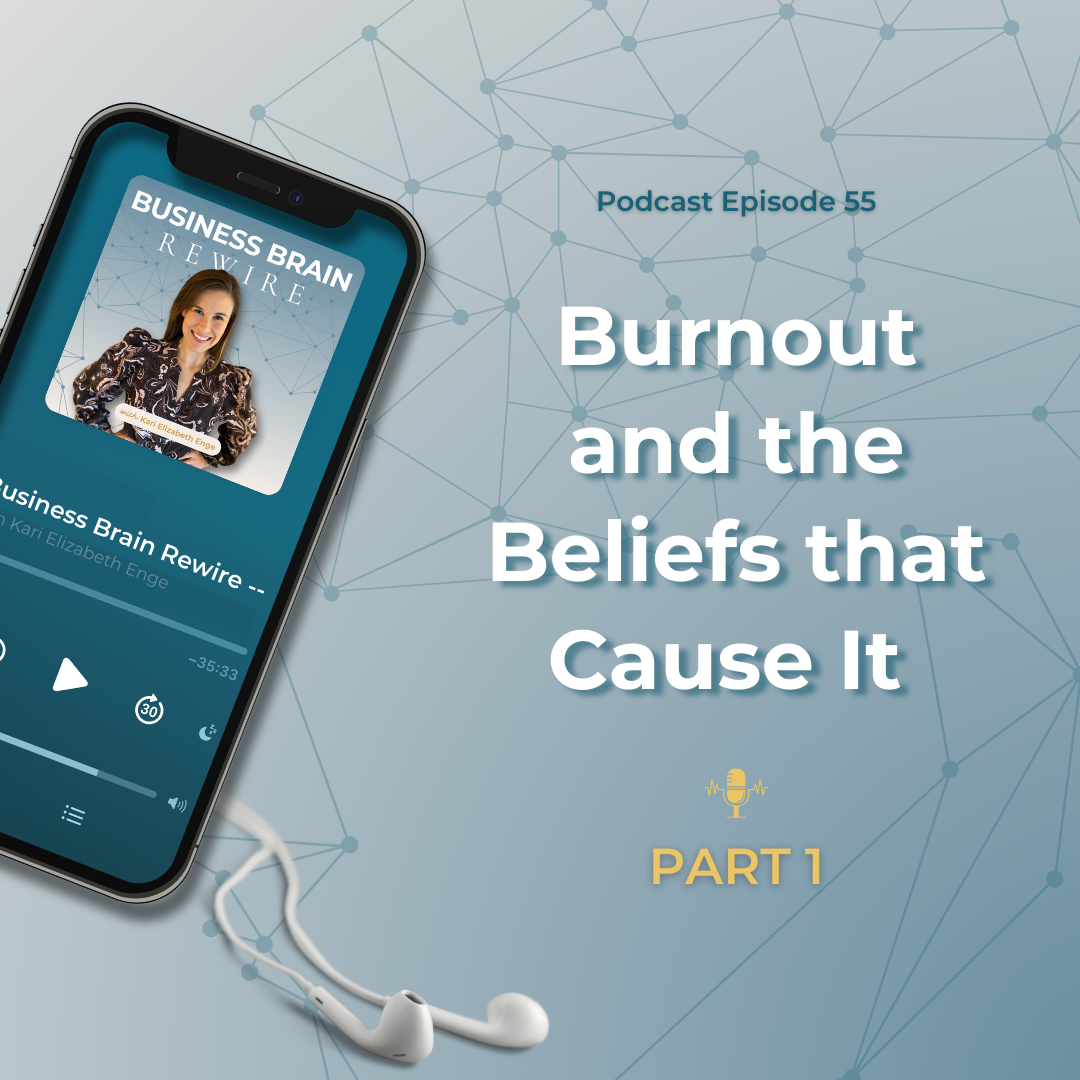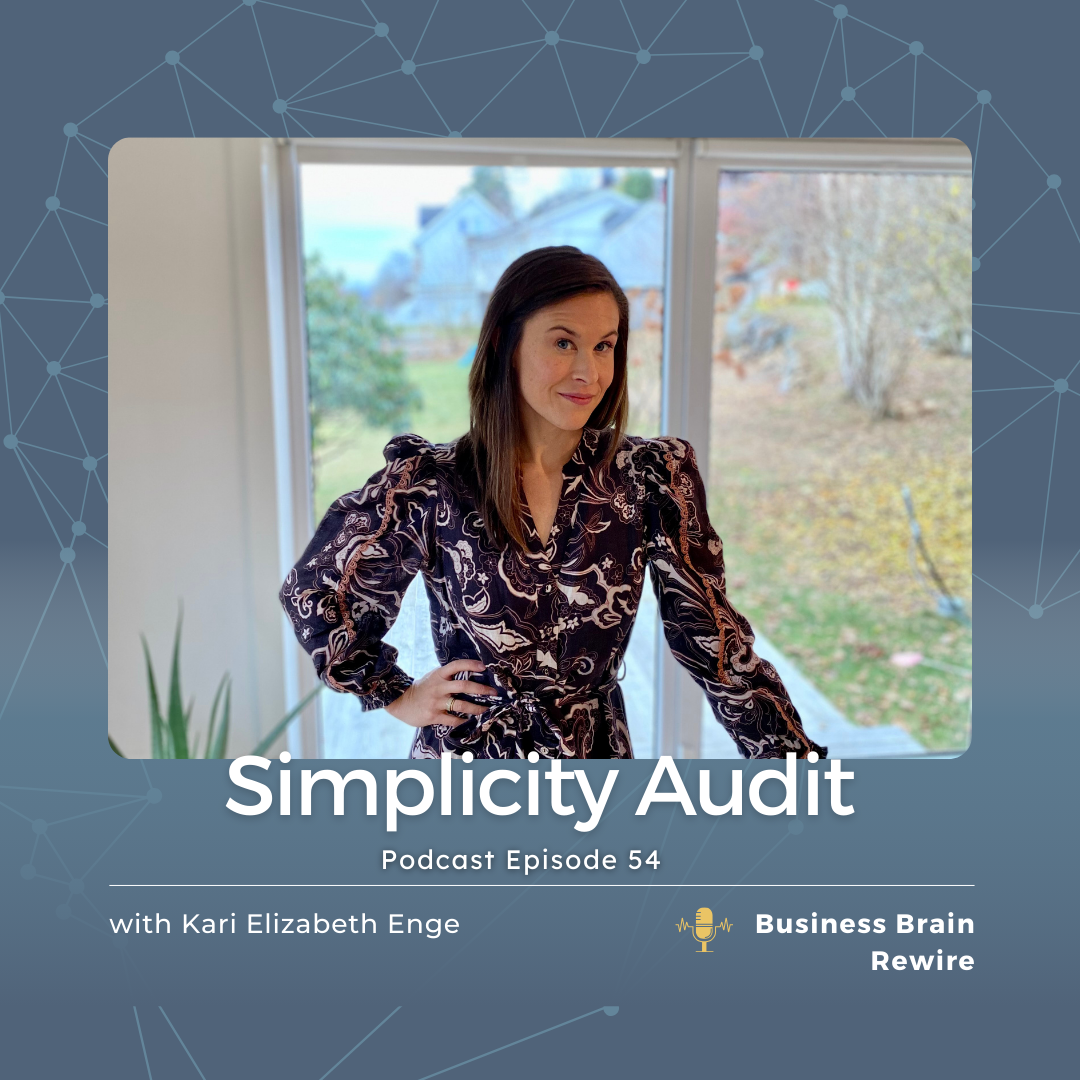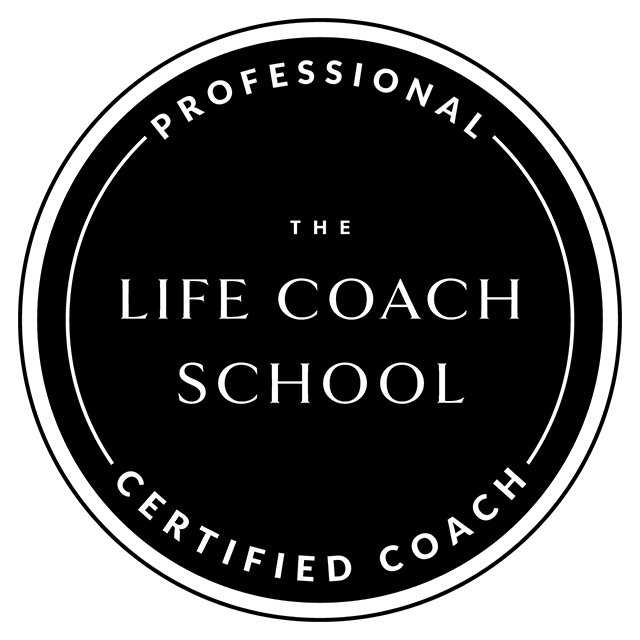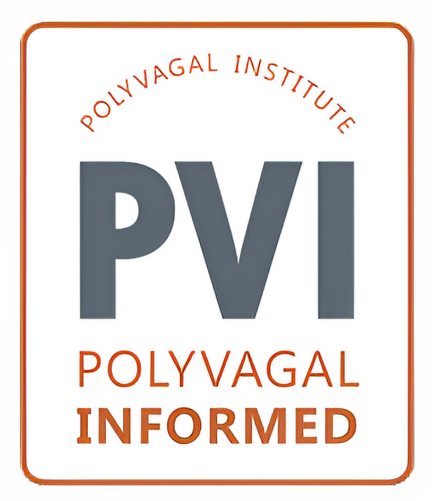Are you ready to go bigger and bolder in your business this year—without the burnout?
In this episode of Business Brain Rewire, we’re diving into Trauma-Informed Massive Action, a revolutionary approach to scaling your business sustainably.
If you’ve ever felt the pressure to “do it all” only to find yourself overwhelmed, scattered, or stuck in chaos, this conversation is for you.
As founders, it’s easy to believe that action is the key to success, but more isn’t always better.
The truth? Overaction leads to stress, burnout, and a team running in circles. Instead, we’re redefining massive action to be focused, intentional, and rooted in simplicity.
You’ll learn why streamlining your strategies, optimizing your nervous system, and overcoming sneaky “brain drama” are the real superpowers behind creating massive growth with ease.
In this episode, you’ll learn:
- Why most action plans fail and the one shift that makes all the difference.
- How your nervous system’s capacity secretly shapes your success.
- The hidden signs of “brain drama” and how it sabotages your progress.
- The simplest strategy to start scaling sustainably today.
This episode is packed with actionable insights and frameworks to help you step into higher levels of visibility, impact, and success while staying grounded. Plus, I’ll share a sneak peek into my 21-Day Nervous System RESET, designed to help founders like you start the year regulated, resilient, and ready for sustainable growth.
If you’ve ever thought, “How can I achieve big goals without sacrificing my well-being?”, this is the episode to revisit all year long.
Tune in now and set the foundation for your most aligned and impactful year yet!
Mentioned in today’s episode:
#1. Right now, My 21-Day Nervous System RESET Course is available and ON SALE! Snatch it up for the discounted price below during the month of January only >> Get access to the RESET here
#2: Every Monday, I share a neuroscience-based strategy to grow your company that you won’t find anywhere else. Subscribe to get access to the systems you need for sustainable success.
Transcript:
[00:00:00] Hello, and welcome back to the show. Today, we’re going to talk all about how to go bigger and bolder this year in your business. I hear this a lot in coaching conversations and in founder conversations. Entrepreneurs will come to me and they’ll say, I want to go bigger and bolder, but I don’t want to burn out. I don’t want to do the corporate rat race like I used to do. I have this big vision for my company, but I want it to be sustainable. I want to create a big impact in the world and to step into new levels of visibility, maybe I want to write a book or become a thought leader or do speaking or become a more confident face for my company. In order to do that, I need to be able to feel, see for in those rooms.
[00:01:33] But how do I do that, in practice? How do I handle everything that my company throws at me and still have capacity for that and for my personal life and wellbeing. These are all really great questions. We are going to talk about them today because it’s important as a founder that you understand how to take a lot of action in your business. Action is important for producing results. How do we think about that in the right way so that we don’t over action? Or take actions that don’t move the needle and just drive up stress? So that’s going to be the conversation today. This is one of the most important things that you can really learn as a founder. So I recommend that you listen to this episode over and over this year to come back to some of the principles that I’m going to share with you.
[00:02:25] The first thing that we need to really review is to define what it is. A lot of founders think that taking action is their competitive advantage. They think that is the key to success. Just getting out there and going big or going home and just doing as much as they can, as fast as they can. But doing all the things in your business is not a strategic plan. It is a recipe for chaos. A lot of founders are unknowingly over actioning. They think that what is on their action plan is required for success. But when an outside coach or mentor looks at it, they say, whoa, you are doing way too much. You’re spreading yourself way too thin. The things on your list are not being executed well. We need to pair it back. Simplify and execute a few things really well, unintentionally, and that will actually move the needle faster than trying to be everywhere all at once. Sprinkling yourself all around the social media channels and trying to grow your business by just bouncing from one thing to the next.
[00:03:41] Massive action is not over actioning. Massive action doesn’t mean that you have a packed marketing plan, a packed to do list, that will just create a lot of burnout. What massive action is, is a very focused and intentional, strategic plan that is simple.
[00:04:03] Now when you’re creating a plan. It’s important to think about everything required for the things on your list. Each thing, for example, in a marketing strategy needs to have time for planning, for delegating, for actually implementing and executing it the amount of time that it takes to set those things up. And also time to evaluate what happened after you did it so that you can come to the evaluation table, look at what worked, look at what didn’t work and tweak it slightly for the next couple of months that you’ll try it again in a slightly different way. All of those things take a lot longer than founders think. They think that they can take an action and about one third of the amount of time that it actually takes, because they just haven’t done it yet. They don’t understand how much planning goes into it, how much time it takes to get their mindset in the right place. How long it takes to actually complete all the steps, set everything up, do the thing. What happens is they have to cut corners, somewhere, to stay on track with their timelines. What they’ll do is they will cut down on the planning, they’ll rush things. Or they won’t do the evaluation at the end. They won’t look at what worked and what didn’t for this particular strategy. They’ll just keep going to the next thing. But they won’t have time to plan it, so they’ll just throw it together and they’ll do it and then they won’t evaluate and they’ll just run to the next thing. They become really full of chaos. The team just is bouncing from one action to another. Not intentionally planning ahead of time, taking a bird’s eye view about what they want to accomplish and the most streamlined way to do it, and not creating that space to evaluate very often.
[00:06:01] What you want to do when you’re creating your action plans, is to give yourself a lot of space for each strategy that you’ve chosen. You really shouldn’t have more than a couple of things on your marketing strategy, especially if you are a smaller team, like most of you listening are.
[00:06:22] You should have a very streamlined action plan where your team really has the space to intentionally show up there, look at data often and make tweaks through evaluation. So trauma informed massive action is first and foremost about streamlining and simplifying, which is the opposite of what most founders do, because most founders just think I just need to do as much as we can so that we can keep the lights on.
[00:06:49] It’s about sitting down and looking at what do we need to accomplish in the short term? What is the most strategic, simple way to get this information, to get this learning and to move the needle to this very next milestone? The rest of it can wait. It can be put on the nightstand. You’ll get to it. Massive action becomes so much easier when you’ve chunked it down and you’re not trying to solve for too many things at the same time. I love the definition of overwhelm, which is trying to solve for too many things at the same time. Whenever you experience overwhelm, you know that you’ve just put too much on the table for a particular period of time. In order to get through the overwhelm, you just have to try to solve for less or increase the amount of time and the overwhelm will subside. Unless you are outside of your nervous system’s window of tolerance, which we’ll talk about in just a few minutes.
[00:07:43] Simplicity will really sharpen your focus and remember clutter will cloud your progress. Massive action is about that intentionality. So that’s step number one, really understanding that simplicity is what needs to drive the bus for your business this year. If you want to have massive growth.
[00:08:06] Now. Simplicity can’t happen if you don’t know what you’re solving for, if you don’t know what your niche is, if you don’t know what your product is, if you don’t know what your message is, or at least the message that you’re testing at this particular time. So sometimes, creating a strategic action plan is about starting with those core business decisions. Those core business model decisions. A lot of startups especially will be so in a hurry to get out there to start talking, that they will set themselves up on all of the social media platforms. They’ll even start podcasts and direct outreach and all this stuff, and they have not even defined what they’re selling or who they’re selling it to. Which is completely crazy because you’re using all of that bandwidth talking to no one. It’s so easy to accidentally do this because we just see everybody online and we think, oh, we need to be doing that to as quickly as possible. I need to grow my audience. I need to grow my newsletter. But unless you’re growing your newsletter with a specific type of person that you’re going to sell something to, you don’t want those random people on your list anyways. We really need to make sure that all the core decisions of the business are made before we start taking massive action and that includes, like I said, your niche, your offer, your core messaging and the simple sales funnel that you are going to run and look at the data and evaluate, on a consistent basis.
[00:09:42] I always tell, especially new founders that I’m working with, that we should only be learning how to talk to one audience at a time, learning how to sell one product at a time and learning how to optimize one sales funnel at a time, especially if we are a very small team. It doesn’t have to take a long time. It can just take a couple of weeks to get some momentum with a sales funnel, before we say, okay, that’s either working or not working. But trying to do several channels or several audiences or several or offers at the same time, it’s just a recipe for chaos. So simplicity is where we begin.
[00:10:38] The second thing that is really important for you to take a massive action in your business is to understand the importance of your nervous system. We talk a lot about this at the do business better school and on this podcast, and I will probably start sounding like a broken record at this point. The reason that we talk about it so much is that the business world is just so behind in their understanding of the nervous system. They do not take a trauma informed approach to business. So the startup culture especially will motivate the founder and encourage the founder to ramp up their stress response, in an effort to get them to take action. They will use things like tough love and willpower and discipline and deadlines and timelines and look at all these other people going big over here. You need to fake it till you make it and just keep going and try things and eventually you’ll succeed.
[00:11:44] What that can do very easily is turn on your fight flight freeze, stress response. Stress happens in your body, especially traumatic stress, which is very common for founders, even though they’re not aware of it, it happens when something is too much, too fast or too soon for your nervous system.
[00:12:06] Your nervous system has a certain capacity of what it can handle at this very moment. It has a capacity for how much money it can hold, how much responsibility it can hold, and how much visibility and failure it can hold right now. If you go outside of those limits too much, too fast, too soon, you will hit a wall. Your nervous system will kick in and say, too much. It will give you symptoms that will make you pull back. For example, it will ramp up your adrenaline and cortisol and cause you to have symptoms, like not being able to turn off your business brain at night, and feeling anxious or having trouble sleeping or burning out and feeling really drained. It will cause you to have a lot of confusion and complexity and trouble making decisions, which is another form of procrastination, right? You won’t move forward with the thing that you need to make a decision on an action.
[00:13:09] These are all ways that your nervous system slows things down because it just fundamentally doesn’t feel safe. Our nervous systems are very primal. They are wired just to keep us alive. They’re not wired for our personal development and our entrepreneurial aspirations and we can hit our current capacity really easily as founders. It’s not a matter of if you go outside of this window of tolerance, it’s a matter of when and how often and for how long you stay outside of your window of tolerance before your nervous system shuts you down and holds you back so that you come back into your limits.
[00:13:54] We don’t want to follow the go big or go home approach that a lot of accelerators and startup culture is teaching. You want to make sure that you are staying within your limits. Now that doesn’t mean that you just pull back or postpone. I think, unfortunately that’s a lot of what sometimes people do when they’ve hit a burnout. They hold back. They don’t go big. They postpone. They procrastinate. They keep reinventing the wheel. They keep changing their niche, changing their product, changing their idea, dibble dabbling a little bit before, oh, something’s come up in my life that I, you know, it’s not the right time. Maybe next year, maybe next month.
[00:14:39] This is not the answer, right? That will make you so frustrated if you cannot go for your dream, because it’s just too much for your system. What we want to do, is we want to slowly increase your capacity to build more resilience in your nervous system so that you can handle more money, more responsibility, more visibility, more amounts of failure, and feedback in a way that feels good and that is doable so that you slowly expand over time.
[00:15:14] This is a non negotiable skillset if you really want to grow this year without burning out. In order to start working with your nervous system is actually easier than you think. I have a course open right now called the 21 day nervous system reset. I normally don’t open it up to people outside of my simply sustainable program, but I’ve done so this January. I’ve taken it out of the big program and I’m selling it at a discounted price. It will walk you through how to work with your nervous system as a founder in just 21 days. It only takes about 20 minutes a day. It is a very interesting course. It is very educational, very fun, and the tools are very intuitive and they work really well for founders. It is a fantastic way to start your year and the things you will learn will be things you carry with you for the rest of your career. It is the answer to going bigger and a way that feels fun and doable.
[00:16:16] What I love about working with your nervous system is that when you stay regulated, when you stay in the place state, when you stay really calm and grounded, you naturally access the smartest parts of your brain, which means that your ideas will be better. Your strategy will naturally be simpler because your brain won’t be trying to overcompensate. It won’t be the saying, oh, we need to be there and we need to be there. There’ll be less fear. You will feel more confident doing your simple strategy and you’ll be executing it in a higher quality way. You will be regulated. You will be sending signals of safety to other humans. You will sell more effectively as well. Because we communicate with other humans using mirror neurons and using facial cues and a lot of things that have to do with just our nervous systems and the state that our nervous systems are in. This is such a cool course. I hope that you will join me this January.
[00:17:22] Okay. Back to the areas of massive action. The third step for stepping into your business in a bigger and bolder way this year, is learning how to deal with what I call brain drama. Brain drama is a little different than just nervous system dysregulation, like burning out, can’t sleep, can’t turn off your business brain, feeling anxious, feeling overwhelmed, in decision. Brain drama is unique because it doesn’t feel bad. Brain drama feels strategic. Brain trauma is like when you get an idea or an urge or this need to do something in the business that feels really smart, but really deep down it’s self sabotage.
[00:18:15] It’s you holding back. Reinventing the wheel. Perfecting. Postponing. Holding off. I’ll give you some examples. Number one is procrast to learning. Okay. Going out to get more certifications, more education. Or it can be, beautifying the business, spending time, working on branding and, making things more professional. It can be not having the support you need not having enough time or not having enough money. Your brain is really good at coming up with excuses that are very convincing. Your brain will be like, oh, nope, it’s not the right time, and you’re like, yes, that is strategic. I will do it next month. That is the best thing for me and my business, but really it’s just procrastination.
[00:19:07] It’s brain drama. It feels necessary. It feels smart. It never is. It’s really helpful for you to learn how to spot brain drama and it’s difficult to do without education and without someone helping you to spot it because it’s so convincing. It’s so sneaky. You need to get help with identifying it and also to get coaching tools to help you to move past it. Not every idea is a good idea. Not every action is a needle moving action. Not every timeline is a smart timeline. Not every goal is a smart goal. Not everything that you take out of an evaluation is the most strategic way to pivot your business. It really helps to have some coaching frameworks, some evaluation frameworks in order to make sure that you’re guiding your founder brain to the most strategic place.
[00:20:03] This is what we do inside simply sustainable every single week. I invite you to check out the full version of that program as well. We have calls every single week where you can bring your, challenges to the table and we work through those together. Over time, you become a much smarter founder who understands the way to think and feel and do inside of your business in a more strategic way.
[00:20:28] Remember massive action is not about doing more. It’s about doing what matters. If you take steps forward with any of these three things that I’ve talked about today: simplifying, working with your nervous system and working through brain drama. You will see that you automatically go bigger and bolder and it will not feel as hard as you think it does, right this moment. Your nervous system will create the space for you to step into it and a way that can feel fun and doable. Doable. All right.
[00:21:07] I hope that this episode gives you lots to think about. I would recommend starting with number one, simplifying and working your way through all three of these items this year. Of course, I invite you to join me for the 21 day reset this January, that will really ensure you start things off with a bang this year, in a way that feels safe and doable. All right. I wish you a wonderful 2025, and I will see you back here next week.
[00:01:33] But how do I do that, in practice? How do I handle everything that my company throws at me and still have capacity for that and for my personal life and wellbeing. These are all really great questions. We are going to talk about them today because it’s important as a founder that you understand how to take a lot of action in your business. Action is important for producing results. How do we think about that in the right way so that we don’t over action? Or take actions that don’t move the needle and just drive up stress? So that’s going to be the conversation today. This is one of the most important things that you can really learn as a founder. So I recommend that you listen to this episode over and over this year to come back to some of the principles that I’m going to share with you.
[00:02:25] The first thing that we need to really review is to define what it is. A lot of founders think that taking action is their competitive advantage. They think that is the key to success. Just getting out there and going big or going home and just doing as much as they can, as fast as they can. But doing all the things in your business is not a strategic plan. It is a recipe for chaos. A lot of founders are unknowingly over actioning. They think that what is on their action plan is required for success. But when an outside coach or mentor looks at it, they say, whoa, you are doing way too much. You’re spreading yourself way too thin. The things on your list are not being executed well. We need to pair it back. Simplify and execute a few things really well, unintentionally, and that will actually move the needle faster than trying to be everywhere all at once. Sprinkling yourself all around the social media channels and trying to grow your business by just bouncing from one thing to the next.
[00:03:41] Massive action is not over actioning. Massive action doesn’t mean that you have a packed marketing plan, a packed to do list, that will just create a lot of burnout. What massive action is, is a very focused and intentional, strategic plan that is simple.
[00:04:03] Now when you’re creating a plan. It’s important to think about everything required for the things on your list. Each thing, for example, in a marketing strategy needs to have time for planning, for delegating, for actually implementing and executing it the amount of time that it takes to set those things up. And also time to evaluate what happened after you did it so that you can come to the evaluation table, look at what worked, look at what didn’t work and tweak it slightly for the next couple of months that you’ll try it again in a slightly different way. All of those things take a lot longer than founders think. They think that they can take an action and about one third of the amount of time that it actually takes, because they just haven’t done it yet. They don’t understand how much planning goes into it, how much time it takes to get their mindset in the right place. How long it takes to actually complete all the steps, set everything up, do the thing. What happens is they have to cut corners, somewhere, to stay on track with their timelines. What they’ll do is they will cut down on the planning, they’ll rush things. Or they won’t do the evaluation at the end. They won’t look at what worked and what didn’t for this particular strategy. They’ll just keep going to the next thing. But they won’t have time to plan it, so they’ll just throw it together and they’ll do it and then they won’t evaluate and they’ll just run to the next thing. They become really full of chaos. The team just is bouncing from one action to another. Not intentionally planning ahead of time, taking a bird’s eye view about what they want to accomplish and the most streamlined way to do it, and not creating that space to evaluate very often.
[00:06:01] What you want to do when you’re creating your action plans, is to give yourself a lot of space for each strategy that you’ve chosen. You really shouldn’t have more than a couple of things on your marketing strategy, especially if you are a smaller team, like most of you listening are.
[00:06:22] You should have a very streamlined action plan where your team really has the space to intentionally show up there, look at data often and make tweaks through evaluation. So trauma informed massive action is first and foremost about streamlining and simplifying, which is the opposite of what most founders do, because most founders just think I just need to do as much as we can so that we can keep the lights on.
[00:06:49] It’s about sitting down and looking at what do we need to accomplish in the short term? What is the most strategic, simple way to get this information, to get this learning and to move the needle to this very next milestone? The rest of it can wait. It can be put on the nightstand. You’ll get to it. Massive action becomes so much easier when you’ve chunked it down and you’re not trying to solve for too many things at the same time. I love the definition of overwhelm, which is trying to solve for too many things at the same time. Whenever you experience overwhelm, you know that you’ve just put too much on the table for a particular period of time. In order to get through the overwhelm, you just have to try to solve for less or increase the amount of time and the overwhelm will subside. Unless you are outside of your nervous system’s window of tolerance, which we’ll talk about in just a few minutes.
[00:07:43] Simplicity will really sharpen your focus and remember clutter will cloud your progress. Massive action is about that intentionality. So that’s step number one, really understanding that simplicity is what needs to drive the bus for your business this year. If you want to have massive growth.
[00:08:06] Now. Simplicity can’t happen if you don’t know what you’re solving for, if you don’t know what your niche is, if you don’t know what your product is, if you don’t know what your message is, or at least the message that you’re testing at this particular time. So sometimes, creating a strategic action plan is about starting with those core business decisions. Those core business model decisions. A lot of startups especially will be so in a hurry to get out there to start talking, that they will set themselves up on all of the social media platforms. They’ll even start podcasts and direct outreach and all this stuff, and they have not even defined what they’re selling or who they’re selling it to. Which is completely crazy because you’re using all of that bandwidth talking to no one. It’s so easy to accidentally do this because we just see everybody online and we think, oh, we need to be doing that to as quickly as possible. I need to grow my audience. I need to grow my newsletter. But unless you’re growing your newsletter with a specific type of person that you’re going to sell something to, you don’t want those random people on your list anyways. We really need to make sure that all the core decisions of the business are made before we start taking massive action and that includes, like I said, your niche, your offer, your core messaging and the simple sales funnel that you are going to run and look at the data and evaluate, on a consistent basis.
[00:09:42] I always tell, especially new founders that I’m working with, that we should only be learning how to talk to one audience at a time, learning how to sell one product at a time and learning how to optimize one sales funnel at a time, especially if we are a very small team. It doesn’t have to take a long time. It can just take a couple of weeks to get some momentum with a sales funnel, before we say, okay, that’s either working or not working. But trying to do several channels or several audiences or several or offers at the same time, it’s just a recipe for chaos. So simplicity is where we begin.
[00:10:38] The second thing that is really important for you to take a massive action in your business is to understand the importance of your nervous system. We talk a lot about this at the do business better school and on this podcast, and I will probably start sounding like a broken record at this point. The reason that we talk about it so much is that the business world is just so behind in their understanding of the nervous system. They do not take a trauma informed approach to business. So the startup culture especially will motivate the founder and encourage the founder to ramp up their stress response, in an effort to get them to take action. They will use things like tough love and willpower and discipline and deadlines and timelines and look at all these other people going big over here. You need to fake it till you make it and just keep going and try things and eventually you’ll succeed.
[00:11:44] What that can do very easily is turn on your fight flight freeze, stress response. Stress happens in your body, especially traumatic stress, which is very common for founders, even though they’re not aware of it, it happens when something is too much, too fast or too soon for your nervous system.
[00:12:06] Your nervous system has a certain capacity of what it can handle at this very moment. It has a capacity for how much money it can hold, how much responsibility it can hold, and how much visibility and failure it can hold right now. If you go outside of those limits too much, too fast, too soon, you will hit a wall. Your nervous system will kick in and say, too much. It will give you symptoms that will make you pull back. For example, it will ramp up your adrenaline and cortisol and cause you to have symptoms, like not being able to turn off your business brain at night, and feeling anxious or having trouble sleeping or burning out and feeling really drained. It will cause you to have a lot of confusion and complexity and trouble making decisions, which is another form of procrastination, right? You won’t move forward with the thing that you need to make a decision on an action.
[00:13:09] These are all ways that your nervous system slows things down because it just fundamentally doesn’t feel safe. Our nervous systems are very primal. They are wired just to keep us alive. They’re not wired for our personal development and our entrepreneurial aspirations and we can hit our current capacity really easily as founders. It’s not a matter of if you go outside of this window of tolerance, it’s a matter of when and how often and for how long you stay outside of your window of tolerance before your nervous system shuts you down and holds you back so that you come back into your limits.
[00:13:54] We don’t want to follow the go big or go home approach that a lot of accelerators and startup culture is teaching. You want to make sure that you are staying within your limits. Now that doesn’t mean that you just pull back or postpone. I think, unfortunately that’s a lot of what sometimes people do when they’ve hit a burnout. They hold back. They don’t go big. They postpone. They procrastinate. They keep reinventing the wheel. They keep changing their niche, changing their product, changing their idea, dibble dabbling a little bit before, oh, something’s come up in my life that I, you know, it’s not the right time. Maybe next year, maybe next month.
[00:14:39] This is not the answer, right? That will make you so frustrated if you cannot go for your dream, because it’s just too much for your system. What we want to do, is we want to slowly increase your capacity to build more resilience in your nervous system so that you can handle more money, more responsibility, more visibility, more amounts of failure, and feedback in a way that feels good and that is doable so that you slowly expand over time.
[00:15:14] This is a non negotiable skillset if you really want to grow this year without burning out. In order to start working with your nervous system is actually easier than you think. I have a course open right now called the 21 day nervous system reset. I normally don’t open it up to people outside of my simply sustainable program, but I’ve done so this January. I’ve taken it out of the big program and I’m selling it at a discounted price. It will walk you through how to work with your nervous system as a founder in just 21 days. It only takes about 20 minutes a day. It is a very interesting course. It is very educational, very fun, and the tools are very intuitive and they work really well for founders. It is a fantastic way to start your year and the things you will learn will be things you carry with you for the rest of your career. It is the answer to going bigger and a way that feels fun and doable.
[00:16:16] What I love about working with your nervous system is that when you stay regulated, when you stay in the place state, when you stay really calm and grounded, you naturally access the smartest parts of your brain, which means that your ideas will be better. Your strategy will naturally be simpler because your brain won’t be trying to overcompensate. It won’t be the saying, oh, we need to be there and we need to be there. There’ll be less fear. You will feel more confident doing your simple strategy and you’ll be executing it in a higher quality way. You will be regulated. You will be sending signals of safety to other humans. You will sell more effectively as well. Because we communicate with other humans using mirror neurons and using facial cues and a lot of things that have to do with just our nervous systems and the state that our nervous systems are in. This is such a cool course. I hope that you will join me this January.
[00:17:22] Okay. Back to the areas of massive action. The third step for stepping into your business in a bigger and bolder way this year, is learning how to deal with what I call brain drama. Brain drama is a little different than just nervous system dysregulation, like burning out, can’t sleep, can’t turn off your business brain, feeling anxious, feeling overwhelmed, in decision. Brain drama is unique because it doesn’t feel bad. Brain drama feels strategic. Brain trauma is like when you get an idea or an urge or this need to do something in the business that feels really smart, but really deep down it’s self sabotage.
[00:18:15] It’s you holding back. Reinventing the wheel. Perfecting. Postponing. Holding off. I’ll give you some examples. Number one is procrast to learning. Okay. Going out to get more certifications, more education. Or it can be, beautifying the business, spending time, working on branding and, making things more professional. It can be not having the support you need not having enough time or not having enough money. Your brain is really good at coming up with excuses that are very convincing. Your brain will be like, oh, nope, it’s not the right time, and you’re like, yes, that is strategic. I will do it next month. That is the best thing for me and my business, but really it’s just procrastination.
[00:19:07] It’s brain drama. It feels necessary. It feels smart. It never is. It’s really helpful for you to learn how to spot brain drama and it’s difficult to do without education and without someone helping you to spot it because it’s so convincing. It’s so sneaky. You need to get help with identifying it and also to get coaching tools to help you to move past it. Not every idea is a good idea. Not every action is a needle moving action. Not every timeline is a smart timeline. Not every goal is a smart goal. Not everything that you take out of an evaluation is the most strategic way to pivot your business. It really helps to have some coaching frameworks, some evaluation frameworks in order to make sure that you’re guiding your founder brain to the most strategic place.
[00:20:03] This is what we do inside simply sustainable every single week. I invite you to check out the full version of that program as well. We have calls every single week where you can bring your, challenges to the table and we work through those together. Over time, you become a much smarter founder who understands the way to think and feel and do inside of your business in a more strategic way.
[00:20:28] Remember massive action is not about doing more. It’s about doing what matters. If you take steps forward with any of these three things that I’ve talked about today: simplifying, working with your nervous system and working through brain drama. You will see that you automatically go bigger and bolder and it will not feel as hard as you think it does, right this moment. Your nervous system will create the space for you to step into it and a way that can feel fun and doable. Doable. All right.
[00:21:07] I hope that this episode gives you lots to think about. I would recommend starting with number one, simplifying and working your way through all three of these items this year. Of course, I invite you to join me for the 21 day reset this January, that will really ensure you start things off with a bang this year, in a way that feels safe and doable. All right. I wish you a wonderful 2025, and I will see you back here next week.
